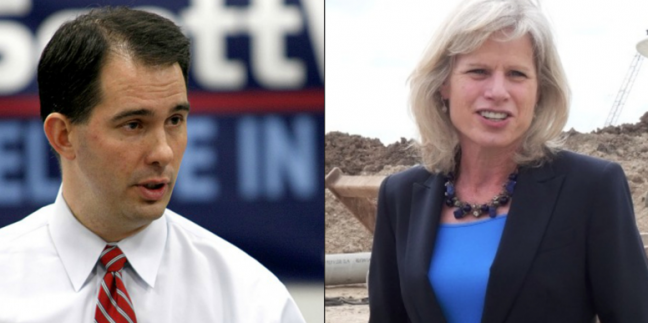With less than 50 days until Election Day, the governor’s race remained in a statistical dead heat for the fourth straight Marquette University Law School poll.
The poll released Wednesday found Gov. Scott Walker is up among likely voters 49 percent to 46 percent against his Democratic challenger Mary Burke, the former Trek Bicycle executive and state commerce secretary. But that result is within the poll’s margin of error.
Meanwhile, both candidates were tied at 46 percent among registered voters.
“The main point is still inside the margin of error, still no evidence now for the 4th poll in a row of a clear frontrunner,” poll director Charles Franklin said at an “On The Issues” event with WISN’s Mike Gousha.
The likely voter results may suggest Republicans are more enthusiastic about the election, Franklin said, a contrast from Marquette’s late August poll that showed Democrats more engaged. The August poll had found Burke was up 2 points among likely voters, compared to the latest results that showed Walker up by 3 points.
As election day nears, results for likely voters become a better predictor of actual outcome, Franklin says. @mulawpoll
— MULawPoll (@MULawPoll) September 17, 2014
Franklin credited the “big shift,” in part, to an increased push from Walker and other Republicans heading into Election Day.
“What has happened is likely voters … have seen a real blossoming of Republican excitement, and that has helped Walker among likely voters,” Franklin said. “Democrats have calmed down a little bit and that, paradoxically, has actually helped them among registered voters because they’re a little less likely to be in the likely category.”
The poll found 80 percent of Republicans said they were more “certain to vote in November,” compared to 73 percent of Democrats who said so. Those numbers flipped from the August poll, which had found 82 percent of Democrats saying they were more “certain to vote” but 77 percent of Republicans saying so.
Franklin says it is possible partisan shift is “an outlier,” but it showed up across the state and in most demographic groups. #mulawpoll
— MULawPoll (@MULawPoll) September 17, 2014
With the economy likely on most voters’ minds, 42 percent of registered voters said Wisconsin’s job creation is lagging behind other states, while 37 percent said the state is adding jobs at the same rate and 13 percent said Wisconsin’s job creation rate is about the same as other states.
Regarding Walker’s 2010 promise that the state would add 250,000 private sector jobs in four years, Franklin said “voters are pretty sure we’re not going to get there.” Eighty-four percent of the state’s registered voters said Wisconsin will not meet that target.
But how important Walker’s pledge will be for November’s election varies among the two parties’ voters. Fifty-four percent of Democrats said the issue was “very important,” compared to 10 percent of Republicans. Independents split on the importance of meeting Walker’s target.
In the attorney general race, the vast majority of the state’s voters are still unfamiliar with the two candidates running to replace Republican Attorney General J.B. Van Hollen. The poll found, however, that half of the state still does not know who Van Hollen is, despite his eight years in office.
For J. B. Van Hollen, after eight years as atty gen, 51% have no opinion of him, 26% favorable, 22% unfavorable. #mulawpoll
— MULawPoll (@MULawPoll) September 17, 2014
The two candidates running to replace Van Hollen are Waukesha County District Attorney Brad Schimel, a Republican, and Jefferson County District Attorney Susan Happ, a Democrat.
Happ’s favorability ratings are 12 percent favorable and 14 percent unfavorable, although 73 percent of the state’s registered voters said they either are unfamiliar with her or had no opinion of her.
Schimel’s numbers were 8 percent favorable and 6 percent unfavorable, with 86 percent of registered voters saying they had not heard enough about him or have an opinion of him.
On the state’s voter ID law — which a federal appeals court reinstated Friday — the poll found 61 percent of registered voters supporting the law and 35 percent opposing it. The poll started interviewing voters on Thursday, a day before the appeals court ruling came down.
In seven polls since 2012, support for photo ID for voters has averaged 62%. Very little change in numbers, Franklin says. #mulawpoll
— MULawPoll (@MULawPoll) September 17, 2014
The poll of landline and cellphone voters was conducted from Sept. 11 to Sept. 14. The sample of 800 registered voters had a 3.5 percent plus or minus margin of error. The 589 likely voters sample had a 4.1 percent plus or minus margin of error.


